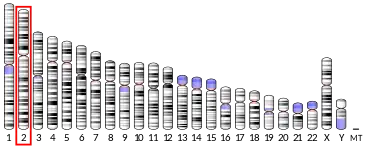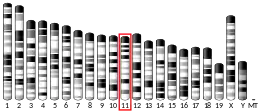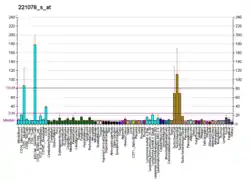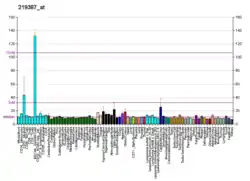CCDC88A
Girdin is a protein that in humans is encoded by the CCDC88A gene.[5][6][7]
References
- GRCh38: Ensembl release 89: ENSG00000115355 - Ensembl, May 2017
- GRCm38: Ensembl release 89: ENSMUSG00000032740 - Ensembl, May 2017
- "Human PubMed Reference:". National Center for Biotechnology Information, U.S. National Library of Medicine.
- "Mouse PubMed Reference:". National Center for Biotechnology Information, U.S. National Library of Medicine.
- Le-Niculescu H, Niesman I, Fischer T, DeVries L, Farquhar MG (Jun 2005). "Identification and characterization of GIV, a novel Galpha i/s-interacting protein found on COPI, endoplasmic reticulum-Golgi transport vesicles". J Biol Chem. 280 (23): 22012–20. doi:10.1074/jbc.M501833200. PMID 15749703.
- Anai M, Shojima N, Katagiri H, Ogihara T, Sakoda H, Onishi Y, Ono H, Fujishiro M, Fukushima Y, Horike N, Viana A, Kikuchi M, Noguchi N, Takahashi S, Takata K, Oka Y, Uchijima Y, Kurihara H, Asano T (May 2005). "A novel protein kinase B (PKB)/AKT-binding protein enhances PKB kinase activity and regulates DNA synthesis". J Biol Chem. 280 (18): 18525–35. doi:10.1074/jbc.M500586200. PMID 15753085.
- "Entrez Gene: KIAA1212 KIAA1212".
External links
- DISC1 Players Gird For Adult Neurodevelopment - Schizophrenia Research Forum, 8 oct 2009
- Human CCDC88A genome location and CCDC88A gene details page in the UCSC Genome Browser.
Further reading
- Kitamura T, Asai N, Enomoto A, et al. (2008). "Regulation of VEGF-mediated angiogenesis by the Akt/PKB substrate Girdin". Nat. Cell Biol. 10 (3): 329–37. doi:10.1038/ncb1695. PMID 18264090. S2CID 23157573.
- Enomoto A, Murakami H, Asai N, et al. (2005). "Akt/PKB regulates actin organization and cell motility via Girdin/APE". Dev. Cell. 9 (3): 389–402. doi:10.1016/j.devcel.2005.08.001. PMID 16139227.
- Simpson F, Martin S, Evans TM, et al. (2005). "A novel hook-related protein family and the characterization of hook-related protein 1". Traffic. 6 (6): 442–58. doi:10.1111/j.1600-0854.2005.00289.x. PMID 15882442. S2CID 25389776.
- Ballif BA, Villén J, Beausoleil SA, et al. (2005). "Phosphoproteomic analysis of the developing mouse brain". Mol. Cell. Proteomics. 3 (11): 1093–101. doi:10.1074/mcp.M400085-MCP200. PMID 15345747.
- Ota T, Suzuki Y, Nishikawa T, et al. (2004). "Complete sequencing and characterization of 21,243 full-length human cDNAs". Nat. Genet. 36 (1): 40–5. doi:10.1038/ng1285. PMID 14702039.
- Strausberg RL, Feingold EA, Grouse LH, et al. (2003). "Generation and initial analysis of more than 15,000 full-length human and mouse cDNA sequences". Proc. Natl. Acad. Sci. U.S.A. 99 (26): 16899–903. doi:10.1073/pnas.242603899. PMC 139241. PMID 12477932.
- Nagase T, Ishikawa K, Kikuno R, et al. (2000). "Prediction of the coding sequences of unidentified human genes. XV. The complete sequences of 100 new cDNA clones from brain which code for large proteins in vitro". DNA Res. 6 (5): 337–45. doi:10.1093/dnares/6.5.337. PMID 10574462.
This article is issued from Wikipedia. The text is licensed under Creative Commons - Attribution - Sharealike. Additional terms may apply for the media files.





